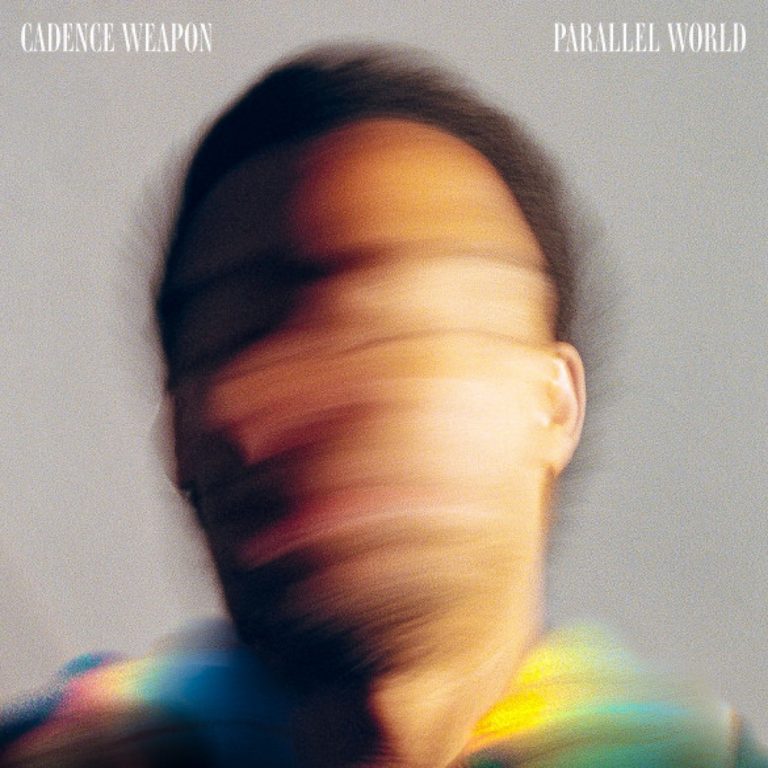In 2018, Roland Pemberton, aka Cadence Weapon, released his fourth and eponymous album, fusing his lyrical bents for intellectual gangsterism and incendiary activism. While his first two albums, and to a lesser degree his third, mined a variety of synth-y and electro-leaning sounds, his fourth, Cadence Weapon, saw Pemberton working mostly with conventional beats and backdrops, his confident though not overly distinct voice in the forefront of his mixes. Cadence Weapon represented a lyrical leap forward for Pemberton; the shortage of engaging sonics, however, compromised the overall impact of the album. With his latest project, Parallel World, the previous Edmonton Poet Laureate (2009-2011) and now Toronto-based artist employs a similar approach, navigating a conservative swath of sonic accompaniments while rivetingly addressing the oppression and exploitation of Blackness in the Western world.
The album launches with the Afro-affirmative manifesto “Africville’s Revenge”. With his introductory verse, Pemberton appoints himself a hip-hop Virgil, leading us through the perditions and purgatories of Western history vis a vis Black life. He opens with the line, “Black is back,” then adding:
“Afrofuturist, black urbanist
Black verbalist, black journalist, revisionist
I resurrect through remembrance
Black communities, stay strong, resilience
Wish my people were treated with reverence
Instead they’re treated as irrelevant
Disrespected ’cause of resemblance
Courts wanna see us be recidivists”
With “On Me”, Pemberton riffs on the theme of intrusive surveillance. While the opening verse generally examines the adversarial relationship between government and citizenry, subsequent verses, including a captivating guest segment courtesy of MC Manga Saint Hilare, emphasize specifically the existential and legal precariousness of Black people in the West. At the end of the song, a robotic voice informs us how facial-recognition software is programmatically biased against Black features, leading to frequent and egregious misidentifications.
Throughout “Senna”, which boasts production from Jacques Greene that makes it one of the project’s more musically noteworthy tracks, Pemberton offers fusillading raps. Greene’s synth-y rhythms and accents frame his voice, forging intriguing juxtapositions between buoyant sounds and provocative content. On “Skyline”, Pemberton offers eerily apocalyptic images of gentrification and communal disempowerment:
“Walked through town, it was looking strange
All I saw was weed places
They wanna keep us sedated
They don’t want civic engagement
LRT stations in Little Jamaica
Lead to mass displacement
Condo ads with white faces
Who’s gonna gain from the changes?”
With “Eye to Eye”, Pemberton again probes the ongoing saga of discrimination and violence against Black people in the West: “I play ball like a prospect / They still look at me like a suspect.” And: “Thank God I made it home today / If I walked another block, mighta gotten blown away.” Backxwash’s brief contribution on “Ghost” is mesmerizing, energetically more than lyrically, giving Parallel World a welcome and perhaps needed dose of fringy-ness and neurotic volatility. The final track, “Connect,” opens as a surreal travelogue, segueing into a political closure: “I want a better future / I want a better solution / Better institutions / Stronger constitution,” a damning diagnosis of a systemically flawed society, accompanied by tentative hope for a better future.
Even if Pemberton’s early lyricism was less high-mindedly articulate than his current work, his first three albums benefited from notable soundscapes and audial embellishments. Memorable sonics were largely absent, however, from Cadence Weapon and are largely absent from Parallel World. Additionally, Pemberton’s voice on his latest outings often occurs as less versatile or multifaceted than on his earlier projects. These ‘missings’ add up, despite Pemberton’s exemplary, at times spellbinding, verbal skills. One can’t help but consider Madlib’s virtuosic collaboration with MF Doom on Madvillainy; The Alchemist’s integral role on Boldy James’ The Price of Tea in China and Armand Hammer’s Haram; and Apollo Brown’s undeniable impact on Planet Asia’s Anchovies and Che Noir’s As God Intended. Were Pemberton to combine his impressively honed lyrical talents and activistic vision with more textured vocals and signature production values, as he does with Jacques Greene on “Senna”, he might well manifest his opus, a project that fires on all cylinders.

